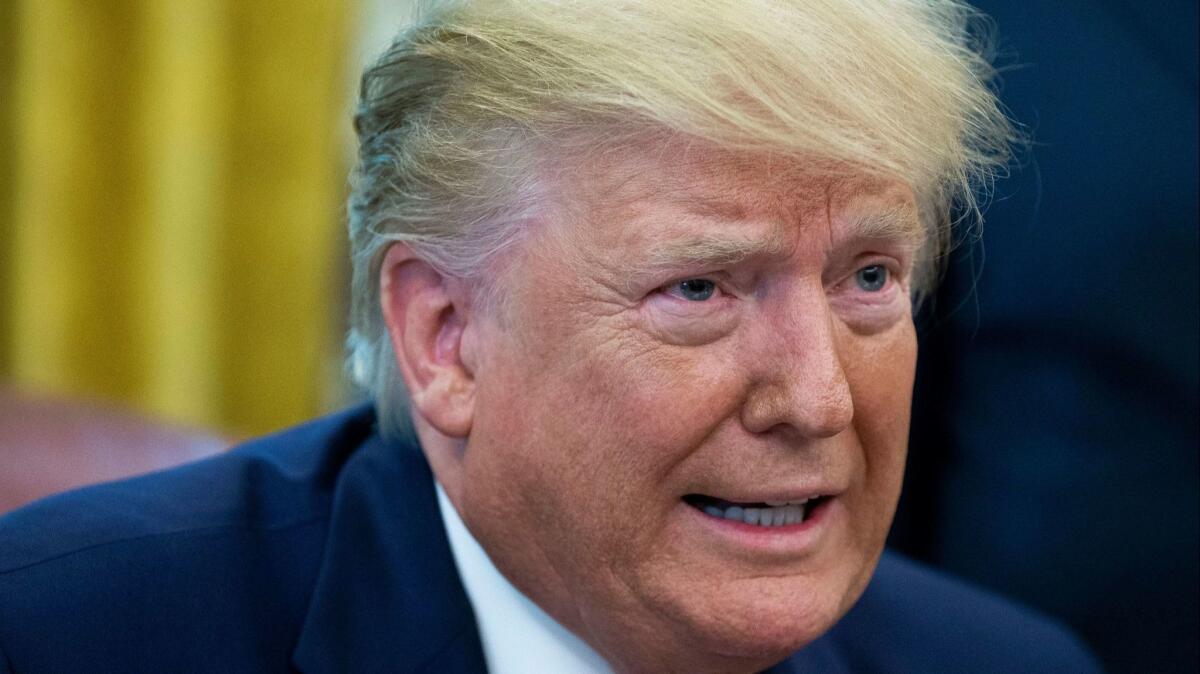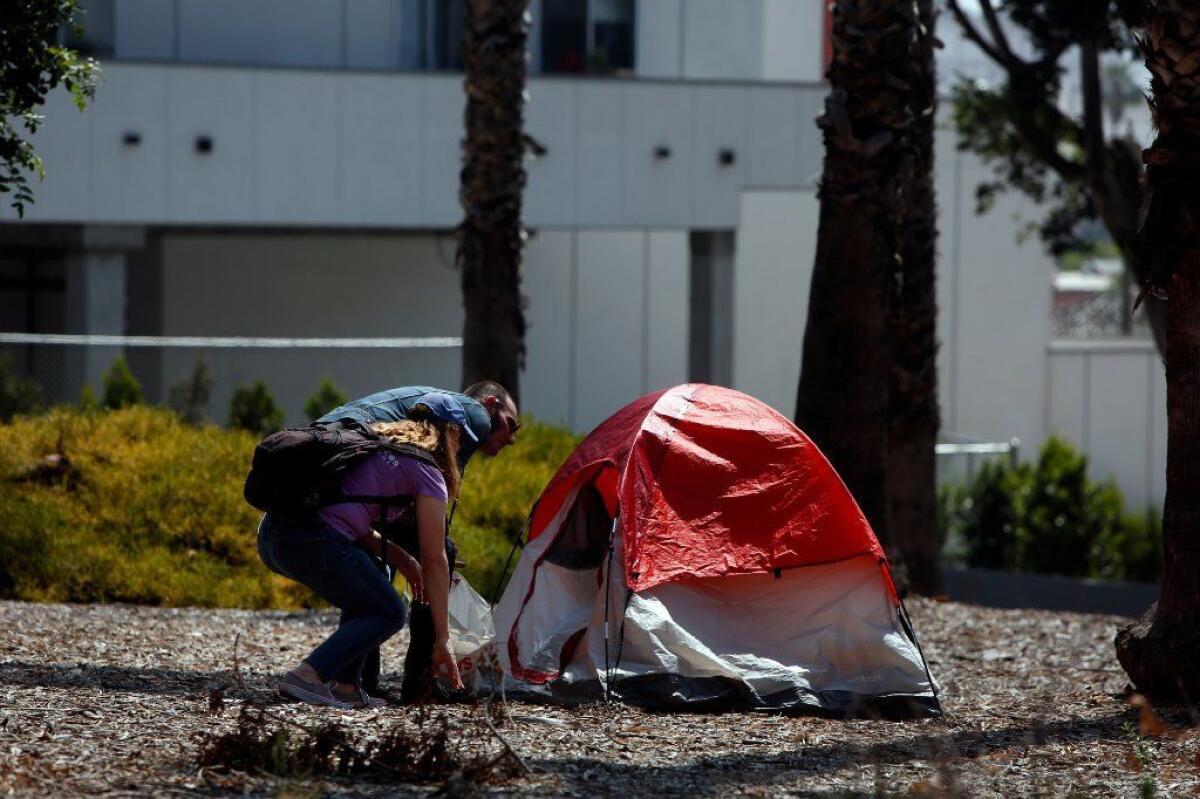Garcetti and Newsom fire back at Trump over homeless remarks: ‘Political cheap shots’

- Share via
For years, President Trump has taken pleasure in beating up on his archnemesis of California, even when his attacks don’t align with the facts.
He has used the state — and the Democrats who run it — as a political punching bag for its management of wildfires, environmental regulations and immigration policies.
Add homelessness to that list.
In an interview with Fox News, Trump laid into Los Angeles and San Francisco, speaking in vivid terms about mentally ill homeless people and how residents “have to walk through a scene that nobody would have believed possible.”
In response, Mayor Eric Garcetti on Tuesday slammed the president’s remarks as “political cheap shots [that] don’t solve difficult problems.”
“I welcome any investment this administration wants to make in our local, and what is a national, problem,“ Garcetti told The Times.
Gov. Gavin Newsom, speaking at a news conference in Emeryville, also attacked Trump, pointing out that Los Angeles and San Francisco are “thriving” economically — much more than the nation as a whole.
“There’s a lot of vibrancy, a lot of good things happening and there’s also a big homeless problem. None of us are in denial about that,” Newsom said. “It’s been festering for years and is getting worse.”
Trump on Monday suggested homelessness in West Coast cities — places run by the “liberal establishment” — was a problem that has emerged in the last two years. He didn’t offer any specific proposals to remedy the crisis, but he did speak at length about how homelessness was ruining cities.
“We may intercede,” he said in the Fox News interview. “We may do something to get that whole thing cleaned up. It’s inappropriate.”
Newsom provided a hot and cold response to Trump’s vow to have the federal government intercede. Newsom said he doubts the president has any idea what his administration might do, and he criticized the Trump administration for slashing housing funds and social programs that are essential to getting people off the streets.
“You’ll have to ask him what ‘interceding’ means. If interceding means cutting budgets to help support services to get people off the street, he’s been very successful, at least advancing those provisions,” Newsom told reporters Tuesday morning.
Then Newsom invited — or dared, in a way — Trump to follow through on his vow of federal intervention.
“It sounds like the president of the United States recognizes he has work to do on this issue. He is apparently committed to some intervention, which is encouraging,” Newsom said. “I’m looking forward to the details of his plan, and obviously he’s going to have to significantly change his budget.”
Garcetti was strident in his criticism of Trump.
The mayor said that there’s been a noted decrease in federal dollars, although those cuts haven’t extended to Los Angeles Homeless Authority, which received $120 million from the the U.S. Department of Housing and Urban Development this year.

He said the federal government could help by increasing investments in permanent supportive housing and shelters, and increase the number of housing vouchers that are available to low-income individuals.
“We would welcome much more action in all those areas and mostly we’ve just gotten talk,” he said.
Garcetti also said Trump needed to do more to educate himself about the issues that are driving people into homelessness, namely a shortage of affordable housing and rising rents. He took issue with Trump’s comments that it was embarrassing for world leaders to visit the United States and see what’s playing out in Los Angeles and San Francisco.
“I hope, as a Christian, as a person who wants to make this country great again — in his own words — that he would take that to the street level, because this was happening on his watch, too,” Garcetti said. “I’m not pointing fingers saying that he totally caused this.”
Garcetti has come under fire over the results of the latest point-in-time count, released last month, which found the number of people living on the streets, in vehicles and in shelters in Los Angeles County rose by about 12% over past year to just shy of 59,000. Within the city of Los Angeles, the number soared to more than 36,000, a 16% increase.
In San Francisco, there was a 17% jump in the number of homeless residents over the last two years, according to preliminary results of the city’s count.
Farther south in the Bay Area, the number of homeless people living in Santa Clara County increased 31% over the last two years, from 7,394 to 9,706, according to preliminary results released by the county. San Jose saw a surge of 1,822 people, for a total of 6,172 homeless residents living in the county’s largest city.
In Los Angeles, residents have been up in arms over homeless encampments, which have been proliferating across the city, and the trash and filth that often accompanies them.
Garcetti said he recently spoke with Ben Carson, secretary of Housing and Urban Development, and invited him to Los Angeles to see how increased federal investment could help the region. Aside from that, he said he’s heard crickets from the White House.
On Tuesday, White House Deputy Press Secretary Judd Deere defended Trump, citing efforts to ”develop a range of policy options” to reduce homelessness, including a recent executive order to study reducing housing regulations.
In Congress, Rep. Maxine Waters (D-Los Angeles) has sponsored a bill that would allocate $13 billion to help cities dealing with homelessness. Garcetti on Monday was part of a group of mayors calling on Congress to pass the legislation, although it faces an uphill battle.
Newsom said California is taking action to address homelessness, while the Trump administration has cut or proposed cuts to funding for vouchers for affordable housing along with Social Security and Medicare.
Speaking at a new, low-income housing project in the Bay Area city of Emeryville, the governor touted his budget agreement with state lawmakers for $2.7 billion to address housing affordability and homelessness this year — a significant increase over recent budgets.
“I don’t know that he’s familiar with the tenets or details of his own budget,” Newsom said of the president, “but if that’s what interceding looks like, I prefer the previous administration’s approach.”
But he quickly added that the it will take all levels of government — from cities and counties to the Trump administration — to address the issue.
Barbara Poppe, the former executive director of the United States Interagency Council on Homelessness under President Obama, said it’s “really interesting that [Trump] has woken up to the problem of homelessness.”
She noted that there’s a proven formula of increased permanent supportive housing and affordable housing that can help reduce the number of people on the streets.
“We know these things work,” she said. “But unfortunately the concern he shows has translated into budget proposals that cut housing benefits.”
Nan Roman, president and chief executive of the National Alliance to End Homelessness, echoed these comments. Like Garcetti, she said that the federal government is, in fact, well positioned to work toward ending homelessness and has been doing so until recently. But Trump has proposed cuts to housing and homelessness programs every year since he has become president, the group said in a statement.
Tommy Newman, director of public affairs for the United Way of Greater Los Angeles, also blamed the federal government.
“Let’s be clear, between 1980 and 1990 federal rental assistance dropped by more than half — that has consequences to this day. Our recent Proposition HHH and Measure H ballot initiatives were, in part, an effort to backfill the loss of significant federal funding,” he said in a statement. “The Trump administration has — with malicious intent — tried to make our homelessness crisis worse, whether that be corporate tax cuts that impact our ability to create low-income housing, slashing the Housing and Urban Development Department budget, and undermining the Affordable Care Act, just to name a few.”
Times staff writers Dakota Smith and Noah Bierman contributed to this report.
More to Read
Sign up for Essential California
The most important California stories and recommendations in your inbox every morning.
You may occasionally receive promotional content from the Los Angeles Times.












